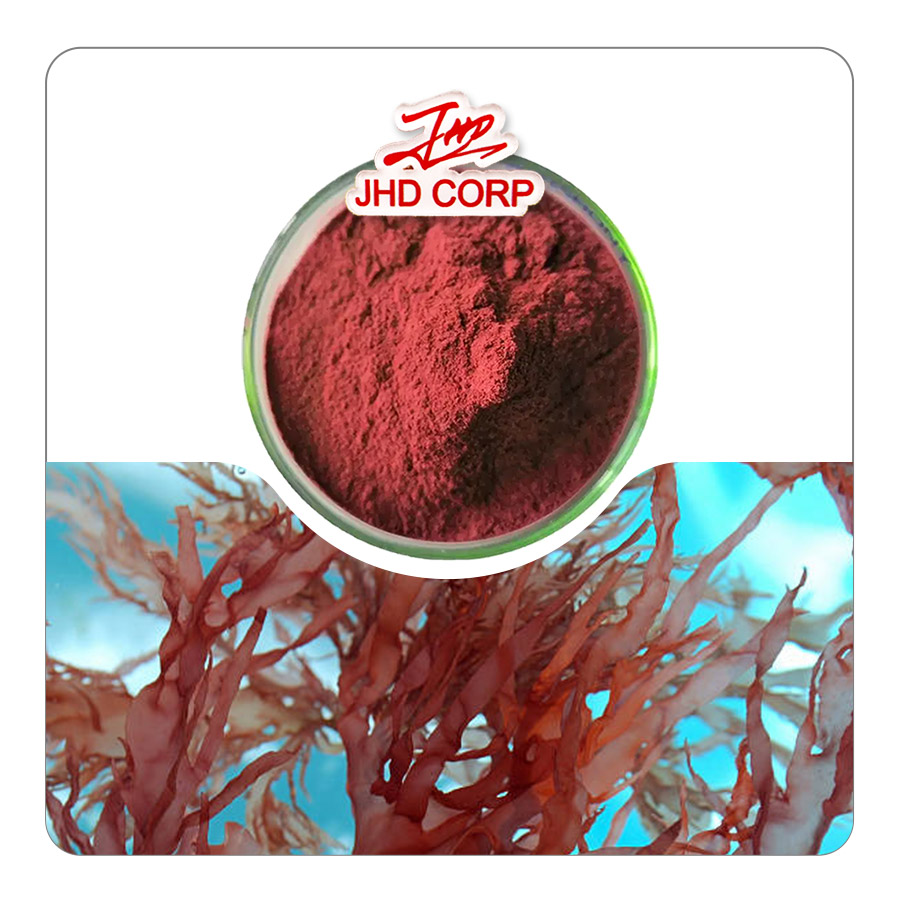Welcome to JHD Nutrasource!
Shop
Astaxanthin
Astaxanthin is a naturally occurring carotenoid pigment found primarily in certain microalgae, such as Haematococcus pluvialis, as well as in some seafood like salmon, shrimp, and krill. It is responsible for the red coloration in these organisms. Astaxanthin is a powerful antioxidant and has gained significant attention for its numerous health benefits. It is typically extracted from microalgae through processes involving cultivation, harvesting, and purification, and is available in various forms such as capsules, softgels, and powders.
Description
| Product Name | Astaxanthin |
| Appearance | red to dark red |
| Specification | ≥10%, ≥20%, or ≥40% |
| Test Method | HPLC |
| Source | the microalgae Haematococcus pluvialis |
| Certificate | Organic,Kosher/Halal,GMP,Non-GMO |
Function
- Antioxidant Properties: Astaxanthin is one of the most potent natural antioxidants known. By reducing oxidative stress, astaxanthin helps protect cells from damage, which can contribute to the prevention of chronic diseases and aging.
- Anti-inflammatory Effects: Astaxanthin has been shown to reduce inflammation by inhibiting the production of pro-inflammatory cytokines and other inflammatory markers. This makes it beneficial for managing conditions associated with chronic inflammation, such as arthritis and cardiovascular disease.
- Skin Health: Astaxanthin can improve skin health by protecting against UV-induced damage, reducing the appearance of wrinkles, and enhancing skin hydration and elasticity. It works both topically and internally to support overall skin health and reduce signs of aging.
- Eye Health: The antioxidant properties of astaxanthin can help protect the eyes from oxidative stress, which is a contributing factor in age-related macular degeneration and other eye conditions. It can also improve visual acuity and reduce eye fatigue.
- Cardiovascular Health: Astaxanthin has been shown to support cardiovascular health by improving blood lipid profiles, reducing oxidative stress in blood vessels, and enhancing endothelial function. This can help lower the risk of heart disease.
- Neuroprotection: Astaxanthin can cross the blood-brain barrier, allowing it to exert antioxidant and anti-inflammatory effects in the brain. This makes it potentially beneficial for protecting against neurodegenerative diseases such as Alzheimer’s and Parkinson’s.
- Sports Performance: Astaxanthin can help reduce muscle fatigue and improve recovery time after exercise. It also enhances endurance and reduces oxidative stress associated with physical activity.
Application
- Dietary Supplements:Astaxanthin is widely used in dietary supplements, often marketed for antioxidant support, skin health, and overall well-being.
- Functional Foods and Beverages: Astaxanthin can be incorporated into functional foods and beverages, such as smoothies, energy bars, and fortified drinks. These products aim to provide additional health benefits beyond basic nutrition, such as improved skin health and reduced oxidative stress.
- Cosmetics and Skincare: The skin – protective properties of astaxanthin make it a valuable ingredient in cosmetics and skincare products. It is used in creams, serums, sunscreens, and other topical products designed to protect the skin from environmental damage, reduce signs of aging, and improve overall skin health.

